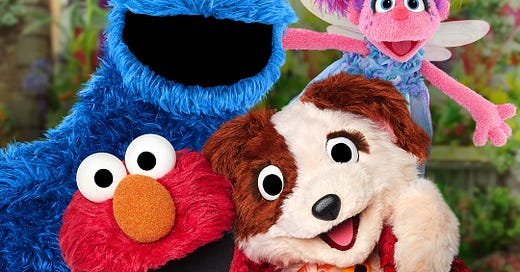Please Don’t Do That—For the Sake of Our Children
How Defunding Public Media Endangers Our Children’s Learning and Well-Being
Way before cell phones, iPads, and even iPods—before Netflix, Disney+, and YouTube—the soundtrack of childhood in America (and many corners of the world) was simple and consistent. It was the theme music of Curious George, the tail-wagging chaos of Clifford the Big Red Dog, the glasses and sass of Arthur, and of course, the friendly lessons of Sesame Street.
These weren’t just shows. They were trusted companions. They filled our homes with joy, curiosity, and knowledge while we, as moms, cooked, cleaned, folded laundry, or sat at our desks trying to finish one more thing. PBS Kids wasn’t just entertainment—it was our free childcare. And we weren’t worried about what our children might absorb, because the programming was safe, educational, and full of heart.
I can’t even comprehend how much our kids learned from it—letters and numbers, yes—but also kindness, patience, and cultural awareness. Later came PBS Kids on the computer, and I’m sure there’s an app now too, though my children have outgrown it. But I still remember the sense of trust. Of being able to walk out of the room and know the TV was reinforcing the values I believed in—values of humanity, diversity, inclusivity, and love. That’s a rare feeling in the era of algorithm-driven, profit-focused content.
That’s why the recent news hit me hard—not just as a deletion of memories, but as a real threat to our social infrastructure.
The Trump administration is reportedly planning to ask Congress to rescind over $1 billion in funding from the Corporation for Public Broadcasting (CPB), which supports PBS, NPR, and hundreds of local stations across the country. This isn’t just a budget cut; it’s a dismantling of one of the few remaining public goods in American media.
In response, CPB is suing the administration for illegally removing three of its board members—all Biden appointees—arguing that as a private, nonprofit corporation, it isn’t subject to presidential control. And it’s true: CPB was deliberately designed to be independent, protecting the integrity of its educational and journalistic missions.
Paula Kerger, the CEO of PBS, called this the most serious threat to public broadcasting she’s seen. And she’s not being dramatic. Kerger explained that while federal funding makes up just 15% of the overall budget, it’s often the lifeline for local stations—especially in rural and underserved communities. Without that funding, many will shut down permanently.
Let that sink in: a loss of eight hours of daily kids' programming, access to local emergency alerts, and community-based storytelling—gone. For many families, especially those without reliable internet access or the ability to pay for streaming services, public broadcasting is not just important—it’s essential.
The administration has criticized public media for “cultural indoctrination” and bias, referencing internal critiques from a former NPR editor. But Kerger pushed back, emphasizing PBS’s long-standing commitment to balanced, fact-based, and deeply educational content. She pointed out what so many of us know from experience: PBS Kids is often the only preschool some children have access to.
Let’s not forget: Sesame Street itself has been a global force for good. Co-produced in over 30 countries, its magic has transcended language and culture. Even in my own childhood, growing up in Pakistan, I remember rushing home from Friday prayers just to catch Big Bird and Elmo on the screen. Sesame Street taught me English, taught me empathy, and made me feel part of a larger world.
This isn’t just nostalgia. This is about equity. In a country where daycare costs as much as college tuition, removing free educational programming is not just cruel—it’s destructive. Not every parent can afford iPads or Disney+ subscriptions. Not every home has a library of educational books or safe, stimulating after-school care. But nearly every home has a TV or radio, and public media meets people where they are.
Some may argue this is about budget priorities, but let’s be honest: cutting CPB funding barely makes a dent in the federal deficit. What it does is rob working-class families, rural communities, and immigrant households of one of the few reliable educational lifelines they have.
PBS has brought us Finding Your Roots, Frontline, American Experience, NOVA, and countless documentaries that reflect the complexity of America. It has won Academy Awards, Emmys, duPont-Columbia awards, and even a Lifetime Achievement honor for beloved chef Lidia Bastianich and 7 NAACP image awards only this year. It’s not fluff—it’s foundational.
So I say this from the heart: Please don’t do this. For the sake of our children.
For the overstretched mom who needs 30 minutes to cook dinner without worry.
For the child in a rural town where public preschool doesn’t exist.
For the immigrant family, learning English and American values through lovable puppets.
We can’t afford to lose what public broadcasting gives us—for free, with love, and with integrity.
If you’ve ever leaned on PBS, I urge you to contact your representatives. Speak up for your local station. Speak up for Sesame Street, for Clifford, for Arthur, and for every curious little mind still tuning in.





tRump and the criminal wrecking crew DO NOT CARE ABOUT ANYONE except their cronies and "contract" options. WA state and many others' are fighting them. Imagine, supporting the murder of people in many places? This IS our criminal government!
Mr. Rogers taught me that adults could be caring (besides my grandma, whom I was lucky to visit almost weekly). Sesame Street taught me that my being different wasn't just okay; it should be celebrated. And Reading Rainbow taught me that there was a way to escape, for real and imaginary, a world of pain and abuse. To get rid of Public Television is beyond disheartening. It is yet another way to attack those of us in the US who are despised by the rich and powerful because there is not a hole in our hearts that can not be filled.